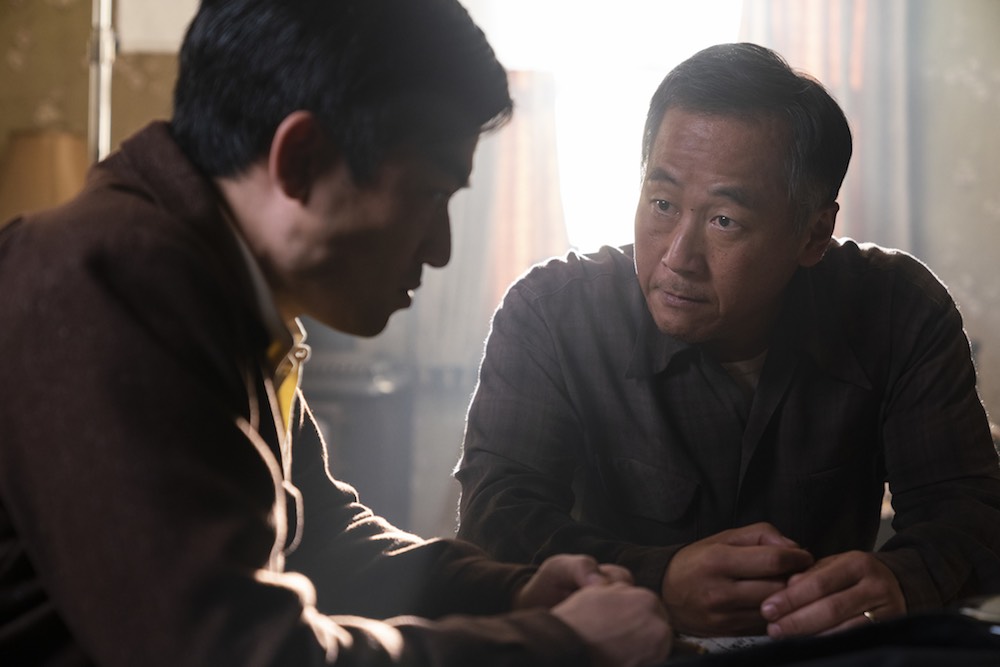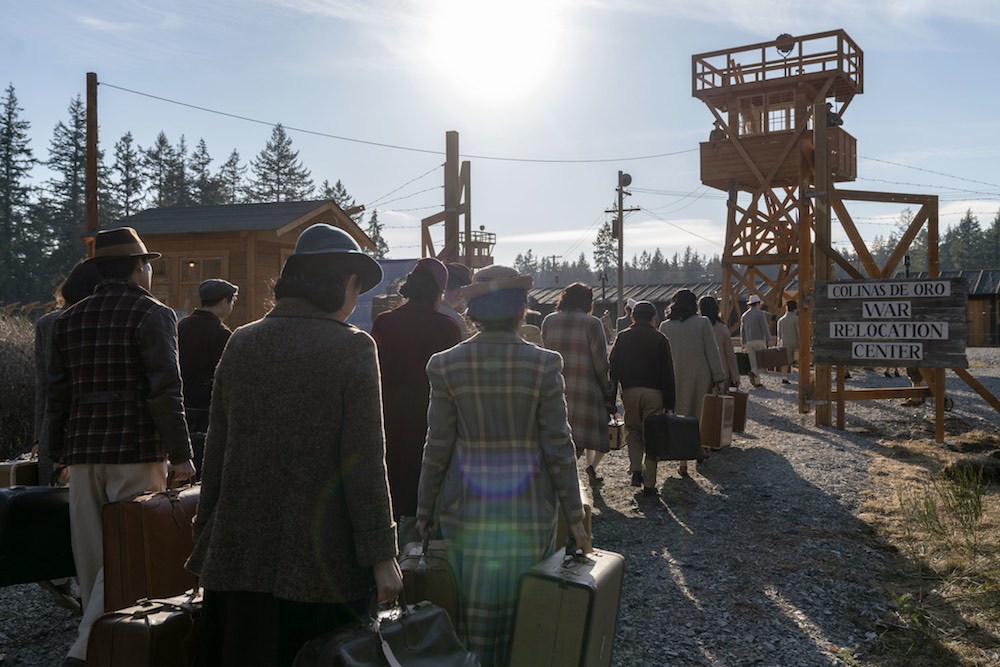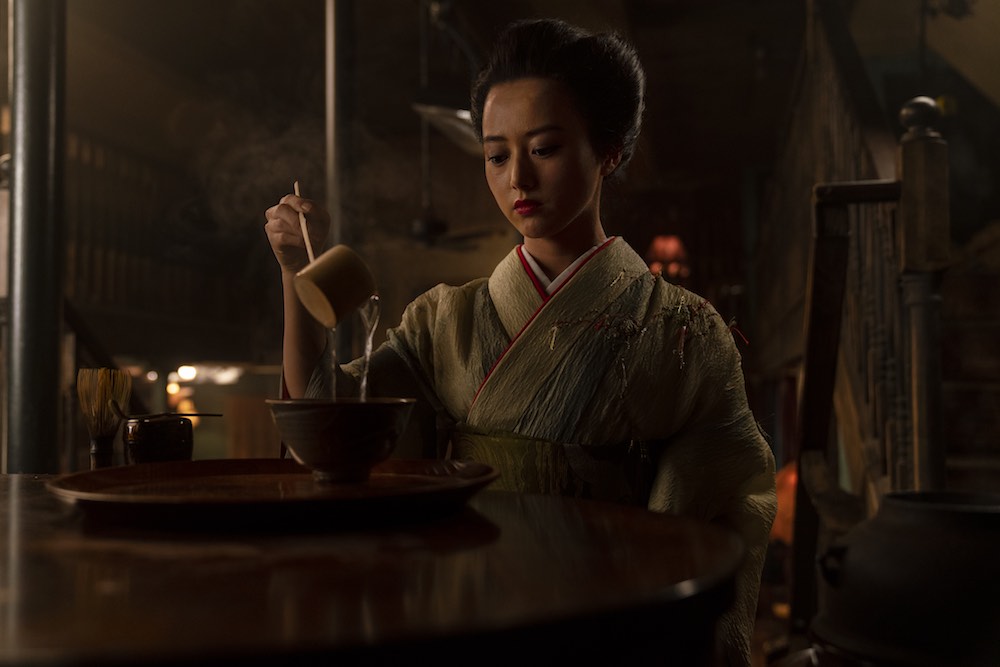A New History, A New Horror in The Terror: Infamy
Showrunner Alex Woo recreates the nightmare of the internment camps
By Richard Whittaker, 2:15PM, Mon. Aug. 12, 2019

About 10 years after Alex Woo's father came to America, he bought a Cadillac. "It was a leather boat," said Wood, "and it was what I learned to drive in." But it wasn't just a car he bought. It was a statement.
Woo recalled, "The Cadillac was, to him, the symbol of having achieved something, even though there was part of him that knew he could never be fully assimilated into the culture – and knowing that your children are. As much as you try to instill some of your own culture, they are always going to be part of the culture they are born into."
That sense of belonging and never truly belonging – of never being allowed to belong – is the subtext throughout The Terror: Infamy, the second season of AMC's historical horror hybrid. In the first season, the show extrapolated an icy nightmare from the true story of the loss of the HMS Erebus and the HMS Terror in 1847. Season two, Infamy, finds a story closer to home and with more contemporary resonances.
Chester Nakayama (Derek Mio) is the American-born son of Japanese migrants, and sees himself as American. But it's 1941, and the attack on Pearl Harbor causes a quick and violent redefinition of what being American truly is: The result is that Japanese-Americans were rounded up and sent to internment camps by the War Relocation Authority, as if genetics or the nation of their birth, or their grandparents' birth, defined them as traitors. It's a stain on American history, and Woo relied heavily on historical researchers – as well as personal experiences from those who went through those camps, including series star and consultant George Takei – to make the show as accurate as possible.
Yet just as the first series saw British seamen clashing with Inuit lore and the vengeful Tuunbaq, so the spirits of Japan have followed the characters across the Pacific. Woo said, "We had on our writing staff a PhD in Japanese folklore, and he was our entree into these things."
However, the emotional core is the relationship between Chester and his father, Henry (Shingo Usami). Woo said, "Chester thinks of himself as wholly American, and his Japanese side is even embarrassing to him." By contrast, Henry knows he will always be an outsider, even while he can buy one of the great trappings of American live – a beautiful, gleaming Packard. There are undoubtedly shades of Woo's own father, and that treasured Caddy. "There's something about the way Henry speaks, his culture, that he could never be fully American. The best he can do is that car."

Austin Chronicle: No spoilers, but the opening scene is one of the strongest set-ups for a show I've seen in quite a while. It really lays out what's happening, the time, the setting, everything about the show.
Alex Woo: I take no credit for it. I feel like it's one of the best scene's I've ever written, and there's no dialogue at all. It's something that's there from the very start. It came up, almost off the cuff, in the first meeting with my researcher: that I want to set the tone of what this show is – before the main titles, before the first scene . Because there may be expectations of what the show is from people who watched the first season, the might think it's a continuation of that.
AC: Not that there would be much leeway for a sequel.
AW: Well. the Tuunbaq is still around. Or it could be the expedition to go find what happened to the first expedition. But we have to explain that it's not, and it's something else entirely.
AC: I know (series creator) Ridley Scott said from day one that this would be an anthology series, with a different story each season. But was this a story that you were working on anyway, and they decided it would fit that format, or was it a response to the format?
AW: My understanding of it was, when AMC decided to do a second season of The Terror, they solicited pitches from a number of writers that they liked. so (cowriter and executive producer) Max Borenstein submitted his pitch, and a few other writers did as well, and they very much liked what Max had, but he wasn't available to write it.
At that time, I was already developing some work with AMC. They brought it to me, I read it, I thought it was fantastic – it was a nine or ten page treatment of the season – but then it was handed to me, and I had to write it, and then run it. But Max also cowrote episode six, which is probably our most elaborate episode – visually, storywise, everything – so he's still very much part of it.
It was February of 2018 when I read Max's treatment, and they said, "OK, we want to put this on next summer." "Alright, we have to get to work! Which summer?" "2019." "OK, which calendar?" "Gregorian." Oh, OK, I'm out of qualifiers now, I suppose it has to go. So it's been a sprint to the finish ever since.
AC: The show is very specifically about the Japanese-American experience during World War II, but your family is from China. It would be easy for someone to say, "Well, this isn't your story," and equally for someone to say, "Oh, that's an Asian-American story," without taking account how pointed the internment policy was.
AW: My approach to it was to be very, very specific. On a historical level, this is a Japanese-American story, and I want to be as accurate and faithful in telling this story as I could, because we have a responsibility to the history; and understanding that there haven't been a million shows about the internment that this would be the first chance a lot of people have to see them.
I myself am not Japanese-American, but on a metaphorical level, it truly is, and it is for anyone who is from an immigrant family, or within a few generations of an immigrant family – which is just about everyone. I started my career in theatre, which is a metaphorical space, and I always work metaphorically. I've written about Asian-American, Chinese-American themes throughout my entire career, but it was never very specifically about me. There was always some strange twist.
AC: There's always a degree of remove, which I think you have to have for metaphor to work.
AW: There's an offset, which may be a peculiarity of my own personality, but I also find it more artful. I feel that metaphor helps me connect, emotionally. So on a metaphorical level, this is very much the story of people coming to a country, believing they belong to a country, and then finding that their country has turned their back on them. That's something that Chinese-Americans can relate to. There was the Chinese Exclusion Act, which wasn't repealed until 1963, which is when my family came over. So emotional connection to it is very strong. So while it's literally not my story, I was very mindful of honoring those people for whom it is literally their story.
AC: One aspect of immigration that comes up is the generational differences, like the difference between Issei (Japanese-born immigrants) and Nisei (the children of immigrants born in the Americas) and Sansei (those children's children). It keys in to this idea of Unamerican, of who feels they belong, and it's both a division that the generations feel, and a weapon used against them.
AW: That tension is very poignant to me, because I feel that the immigrant generation – in this case, the Issei generation – necessarily have to sacrifice some part of themselves to come to a new country, because they know they will never, ever fully be American. They can have a trappings, but in a literal sense the Japanese immigrants could not be citizens.
AC: You mentioned that you started writing for stage rather than screen. How did you find converting between these two very different mediums?
AW: It took me many years to make the adjustment from writing for theater to writing for the screen. In theater, you can these flights of fancy, and you can do these leaps that it would be hard to get away with in television. But then there was this big migration of playwrights to television, and you'd see these things that are very, very common on stage, like direct address to the camera. Frank Underwood talks directly to the camera, and it's a giant shock. But in theatre it's been going on for thousands of years.
What it arms the playwright with is a little toolbox things that you don't see all the time, but you have to do it in miniature. A scene in a stage play can go on for twenty, thirty minutes. But on TV you have to do it in three, and that's a long scene.
AC: Unless it's season four, and you convince the producers to let you do a sealed bottle episode.
AW: And even then, the length of a scene is from one commercial to another. Think of even any premium cable series - apart from In Treatment, which is very much like a stage play – anything longer than ten minutes, you never see. So to get from "I love you" to "I hate you" to "I love you," at least to to it elegantly, is very challenging. But one of the great advantages of television is that it doesn't let you off the hook. In theatre, like it or not, it's one emotional experience that concludes, and the audience can wash their hands of it if they so choose. In television, there is this great strength where you able to leave your audience hanging, and they think about them for the next six days, and talking about them as if they are real.
That's really extraordinarily appealing, to make a world that 's existing in people's minds, and this is one of the things that makes it great to tell this story in television. The internment was not one single thing that was over in two hours – and of course it wasn't over in ten weeks – but we create, I think, a better analog for an experience that did not leave you.
The Terror: Infamy debuts Aug. 12 on AMC, 9/8 Central.
A note to readers: Bold and uncensored, The Austin Chronicle has been Austin’s independent news source for over 40 years, expressing the community’s political and environmental concerns and supporting its active cultural scene. Now more than ever, we need your support to continue supplying Austin with independent, free press. If real news is important to you, please consider making a donation of $5, $10 or whatever you can afford, to help keep our journalism on stands.
April 20, 2024
April 19, 2024
The Terror: Infamy, AMC, Alex Woo, George Takei, Shingo Usami, Derek Mio, Japanese Internment Camps, War Relocation Authority









